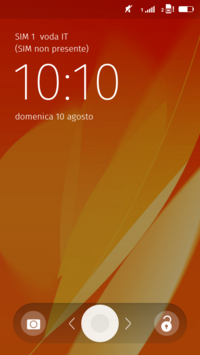
Back Firefox OS Afrikaans فيرفكس (نظام تشغيل) Arabic Firefox OS Azerbaijani ফায়ারফক্স অপারেটিং সিস্টেম Bengali/Bangla Firefox OS Catalan Firefox OS Czech Firefox OS Welsh Firefox OS German Firefox OS Greek Firefox OS Esperanto
 | |
 Firefox OS 2.1 nightly build lock screen (Italian) | |
| Developer | Mozilla Corporation |
|---|---|
| Written in | HTML5, CSS, JavaScript,[1] C++ |
| OS family | Linux (Unix-like) |
| Working state | Discontinued; forked to form KaiOS |
| Source model | Open source[2] |
| Initial release | February 21, 2013 |
| Latest release | 2.2.0 / April 29, 2015 |
| Latest preview | 2.5.0 |
| Repository | |
| Marketing target | Smartphones Tablet computers |
| Platforms | ARM, x86, MIPS |
| Kernel type | Linux kernel |
| Default user interface | Graphical |
| License | Free software (MPL 2.0[2][3]) |
| Official website | mozilla.org/firefox/os |
Firefox OS[4] (project name: Boot to Gecko, also known as B2G)[5] is a discontinued open-source operating system – made for smartphones,[6] tablet computers,[7] smart TVs,[8] and dongles designed by Mozilla and external contributors. It is based on the rendering engine of the Firefox web browser, Gecko, and on the Linux kernel. It was first commercially released in 2014.
Firefox OS was designed to provide a complete,[9] community-based alternative operating system, for running web applications directly or those installed from an application marketplace. The applications use open standards and approaches such as JavaScript and HTML5, a robust privilege model, and open web APIs that can communicate directly with hardware, e.g. cellphone hardware.[5] As such, Mozilla with Firefox OS competed with commercially developed operating systems such as Apple's iOS, Google's Android, Microsoft's Windows Phone,[9] BlackBerry's BlackBerry 10, Samsung's/Linux Foundation's Tizen, and Jolla's Sailfish OS. In December 2015, Mozilla announced it would stop development of new Firefox OS smartphones[10] and, in September 2016, announced the end of development.[11] Successors to Firefox OS include the discontinued B2G OS[12] and Acadine Technologies' H5OS as well as KaiOS Technologies' KaiOS and Panasonic's My Home Screen.[13][14]
- ^ B2G/Architecture - Mozilla Wiki.
- ^ a b "Mozilla Licensing Policies". Mozilla. Archived from the original on May 31, 2013. Retrieved June 18, 2018.
- ^ "Mozilla Eula". Mozilla. Archived from the original on October 21, 2014. Retrieved October 20, 2014.
- ^ "The first mobile in Spain with Firefox OS. Geekphone Keon y Peak". January 22, 2013. Archived from the original on January 25, 2013. Retrieved January 22, 2013.
- ^ a b "Firefox OS". Mozilla. August 21, 2012. Archived from the original on December 4, 2015. Retrieved September 17, 2012.
- ^ Olson, Parmy (April 15, 2013). "Want to Buy A Webphone?". Forbes (paper). p. 52.
- ^ Dotzler, Asa (January 6, 2014). "Mozilla Launches Contribution Program to Help Deliver Firefox OS to Tablets". Archived from the original on June 26, 2018. Retrieved March 19, 2014.
- ^ "Mozilla and Partners to Bring Firefox OS to New Platforms and Devices". Mozilla Corporation. January 6, 2014. Archived from the original on July 2, 2018. Retrieved January 20, 2014.
- ^ a b Gal, Andreas (June 25, 2011). "Booting to the web". mozilla.dev.platform (Mailing list). Retrieved November 20, 2011.
- ^ Lunden, Ingrid (December 8, 2015). "Mozilla Will Stop Developing And Selling Firefox OS Smartphones - TechCrunch". Archived from the original on January 31, 2017. Retrieved January 19, 2017.
- ^ Hoffman, Chris (September 28, 2016). "Mozilla is stopping all commercial development on Firefox OS". PCWorld. Archived from the original on January 16, 2017. Retrieved April 7, 2019.
- ^ "B2G OS". developer.mozilla.org. Archived from the original on April 30, 2016. Retrieved April 3, 2019.
- ^ Cite error: The named reference
torchwas invoked but never defined (see the help page). - ^ "B2G - MozillaWiki". wiki.mozilla.org. Archived from the original on August 7, 2011. Retrieved July 26, 2011.
© MMXXIII Rich X Search. We shall prevail. All rights reserved. Rich X Search